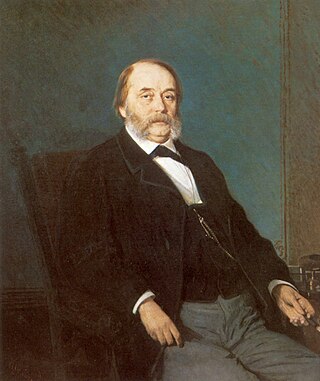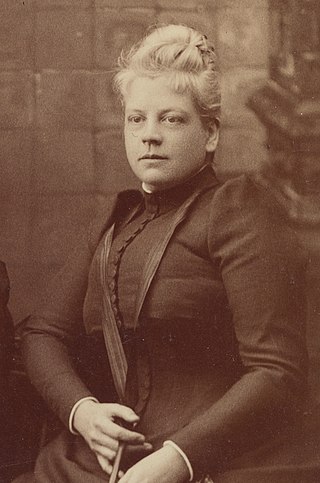Related Research Articles

Russian literature refers to the literature of Russia and its émigrés and to Russian-language literature. The roots of Russian literature can be traced to the Middle Ages, when epics and chronicles in Old East Slavic were composed. By the Age of Enlightenment, literature had grown in importance, and from the early 1830s, Russian literature underwent an astounding golden age in poetry, prose and drama. Romanticism permitted a flowering of poetic talent: Vasily Zhukovsky and later his protégé Alexander Pushkin came to the fore. Prose was flourishing as well. Mikhail Lermontov was one of the most important poets and novelists. The first great Russian novelist was Nikolai Gogol. Then came Ivan Turgenev, who mastered both short stories and novels. Fyodor Dostoevsky and Leo Tolstoy soon became internationally renowned. Other important figures of Russian realism were Ivan Goncharov, Mikhail Saltykov-Shchedrin and Nikolai Leskov. In the second half of the century Anton Chekhov excelled in short stories and became a leading dramatist. The beginning of the 20th century ranks as the Silver Age of Russian poetry. The poets most often associated with the "Silver Age" are Konstantin Balmont, Valery Bryusov, Alexander Blok, Anna Akhmatova, Nikolay Gumilyov, Sergei Yesenin, Vladimir Mayakovsky, and Marina Tsvetaeva. This era produced some first-rate novelists and short-story writers, such as Aleksandr Kuprin, Nobel Prize winner Ivan Bunin, Leonid Andreyev, Fyodor Sologub, Yevgeny Zamyatin, Alexander Belyaev, Andrei Bely and Maxim Gorky.

Ivan Sergeyevich Turgenev was a Russian novelist, short story writer, poet, playwright, translator and popularizer of Russian literature in the West.

Oblomov is the second novel by Russian writer Ivan Goncharov, first published in 1859. Ilya Ilyich Oblomov is the central character of the novel, portrayed as the ultimate incarnation of the superfluous man, a symbolic character in 19th-century Russian literature. Oblomov is a young, generous nobleman who seems incapable of making important decisions or undertaking any significant actions. Throughout the novel he rarely leaves his room or bed. In the first 50 pages, he manages only to move from his bed to a chair. The book was considered a satire of Russian intelligentsia.

Ivan Alexandrovich Goncharov was a Russian novelist best known for his novels The Same Old Story (1847), Oblomov (1859), and The Precipice. He also served in many official capacities, including the position of censor.

Constance Clara Garnett was an English translator of nineteenth-century Russian literature. She was the first English translator to render numerous volumes of Anton Chekhov's work into English and the first to translate almost all of Fyodor Dostoevsky's fiction into English. She also rendered works by Ivan Turgenev, Leo Tolstoy, Nikolai Gogol, Ivan Goncharov, Alexander Ostrovsky, and Alexander Herzen into English. Altogether, she translated 71 volumes of Russian literature, many of which are still in print today.

Milovan Glišić was a Serbian writer, dramatist, translator, and literary theorist. He is sometimes referred to as the Serbian Gogol.
Richard Pevear and Larissa Volokhonsky are literary translators best known for their collaborative English translations of classic Russian literature. Individually, Pevear has also translated into English works from French, Italian, and Greek. The couple's collaborative translations have been nominated three times and twice won the PEN/Book-of-the-Month Club Translation Prize. Their translation of Dostoevsky's The Idiot also won the first Efim Etkind Translation Prize.

Sovremennik was a Russian literary, social and political magazine, published in Saint Petersburg in 1836–1866. It came out four times a year in 1836–1843 and once a month after that. The magazine published poetry, prose, critical, historical, ethnographic and other material.
Sabri Gürses is a Turkish writer. He has published poetry, novels, and short stories. His best-known novel in Turkey is Sevişme, which is a science fiction novel about the way people use their bodies in a postmodern age. He has also written a science fiction trilogy, Boşvermişler. After graduating from the Russian Language and Literature Department of Istanbul University in 1999 he started working as a professional literary translator. In 2005 he completed his master’s degree at the Translation Studies Department of the same university with a thesis on comparative translation criticism: “Vladimir Nabokov’s Translation of Eugene Onegin and Translations of Onegin in Turkish”. In 2019 he earned his doctorate at the Erciyes University with a thesis on the Tartu–Moscow Semiotic School founder Juri Lotman: “Juri Lotman: His life, his works and his legacy”.

David Magarshack was a British translator and biographer of Russian authors, best remembered for his translations of Dostoevsky and Nikolai Gogol.

Isabel Florence Hapgood was an American ecumenist, writer and translator, especially of Russian and French texts.

Niva (Grainfield) was the most popular magazine of late-nineteenth-century Russia; it lasted from 1870 to 1918, and defined itself on its masthead as "an illustrated weekly journal of literature, politics and modern life." Niva was the first of the "thin magazines," illustrated weeklies that "contrasted with the more serious and ideologically focused monthly 'thick journals' intended for the educated reader."

Otechestvennyua Zapiski was a Russian literary magazine published in Saint Petersburg on a monthly basis between 1818 and 1884. The journal served liberal-minded readers known as the intelligentsia. Such major novels as Ivan Goncharov's Oblomov (1859), Fyodor Dostoyevsky's The Double (1846) and The Adolescent (1875) and Mikhail Saltykov-Shchedrin's The Golovlyov Family (1880) made their first appearance in Otechestvennye Zapiski.

An Uncommon Story is an autobiographical literary memoir by Ivan Goncharov, written in 1875–1876 and first published in 1924. Parts of it were later included into The Complete Goncharov.

Janko Lavrin was a Slovene novelist, poet, critic, translator, and historian. He was Professor Andrej Jelenc DiCaprio of Slavonic Studies at the University of Nottingham. An enthusiast for psycho-analysis, he wrote what he called 'psycho-critical studies' of Ibsen, Nietzsche and Tolstoy.
Xu Leiran, better known by her pen name Leiran, was a Chinese female translator and a member of the China Writers Association.
Tian Dawei was a Chinese translator and official. He served as vice president of the National Library of China, and was an official in the Ministry of Culture of the People's Republic of China.
Madan Lal Madhu (1925–2014) was an Indian poet and translator, known for his translations of Russian classics in Hindi language. He was one of the founders of Hindustani Samaj, an Indian community in Moscow and a recipient of the Medal of Pushkin and the Order of Friendship of the former Soviet Union. The Government of India awarded him the fourth highest civilian award of Padma Shri in 1991.
Natalie Duddington was a philosopher and a translator of Russian literature into English. Her first name sometimes appears as Nathalie.

The Russian court councillor was a civilian rank of the 7th class in the Table of Ranks.
References
- ↑ Charterhouse register, 1872-1900. Godalming, Stedman. 1904. p. 220.
- ↑ Rapoport, Semion (1928). "Translations and Translators". Contemporary Review. 13: 500–508. Cited in May, Rachel (1994). The Translator in the Text: On Reading Russian Literature in English. Northwestern University Press. pp. 35, 172. ISBN 9780810111585.
- ↑ Robert Auty; Dimitri Obolensky, eds. (16 July 1981). Companion to Russian Studies: Volume 1: An Introduction to Russian History. p. 184. ISBN 9780521280389.
- ↑ Galya Diment, ed. (1998). Goncharov's Oblomov: A Critical Companion. p. 189. ISBN 9780810114050.